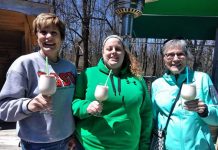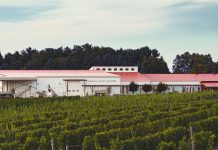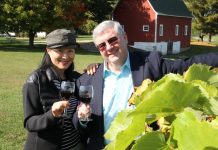
WaterFire Vineyards, the Midwest’s first Certified Sustainable vineyard, is celebrating its fifth anniversary this summer.
Owners Chantal Lefebvre and Mike Newman moved to Michigan in 2007 from Boston. While the two already had established careers, they wanted to be closer to family and were seeking a change in lifestyle for themselves and their young son. A former environmental scientist, Lefebvre was unsure of her next step.
“I got my first taste for the wine industry working retail at Bowers Harbor Vineyards, which I thought would be a fun but short-lived adventure,” Lefebvre says. “It snowballed from there.”
Lefebvre became fascinated by the wine world and began studying to become a sommelier. She worked in retail, in vineyards and in a wine cellar where she met others who were dedicated to winemaking. In 2008, Lefebvre and Newman purchased a 26-acre property in Kewadin and established their own production.
“So, WaterFire was born from an experience I so desired and an innate need to make wine with as little impact on nature as I can,” Lefebvre says. “Starting WaterFire was a true marriage of a love for wine and nature.”
In fact, that marriage is reflected in the name itself: The vineyard is located just outside of Torch Lake, a combination of nature’s elements of water and fire.

Because of her passion for the environment and experience from her first career, Lefebvre made sustainability a priority. After much research and schooling on how to be a low-impact grower, she wanted to obtain some sort of certification. Organic certification wasn’t the best fit, though, because being sustainable and low impact differs from being organic.
Lefebvre discovered Sustainability in Practice (SIP), “a program providing third-party verification that a wine, winery, or vineyard has adopted and implemented stringent sustainable winemaking and wine growing standards,” according to the website.
SIP-certified winegrowers are dedicated to energy efficiency, water conservation, social responsibility and more. SIP’s website says, “Sustainability looks at the three P’s: People, Planet, Prosperity.”
“Similar to organic certification, SIP is a rigorous program, but it extends beyond farming,” Lefebvre says. “SIP requires us to measure impact on our crops and soil, energy and water use, compensation and education offered to employees and the sustainability of our business model.”
WaterFire became the first vineyard in the Midwest as well as the first vineyard outside of California to achieve SIP certification in 2017. Lefebvre and Newman also opened a small tasting room in May of the same year.
Marking Five Years — with Wine
To celebrate the fifth anniversary, WaterFire released its vintage Grüner Veltliner from 2020 as well as the first vintage of the wine from 2013 at a release party on June 24. They’re also making a Pinot Noir and a wild hard cider.

Guests can also try the wines at WaterFire’s new seasonal wine dinner series. Chefs Mike and Pat Evans of Conifer prepare meals from local and seasonal ingredients that are structured around WaterFire wines. The pair share Lefebvre’s devotion to low-impact practices.
The winery also offers more intimate private events such as wine and cheese parties or small plates and wine pairings. WaterFire’s goal is to create a unique experience for each guest.
“Wine is an experiential business,” Lefebvre says.
Starting off without experience in the industry, the owners had limited knowledge. Running the operation, they’ve come to believe that making customer connections is key.
“We can make great wine, we can grow our fruit sustainably, we can offer a nice view, but it’s all about making these experiences matter to our customers,” Lefebvre says. “And for this we rely on our frontline workers.
“Through our farm and business practices, we have attracted people with a common personal mission: to make people happy. Now we are largely a direct-to-consumer operation as opposed to wholesaling or distributing our wine. Our customers are everything.”
Notably, that mission has been a female-led operation for the past three years.
“We can’t speak for other agricultural operations, but when it comes to vineyard work and connecting with customers, we have the best girl-power imaginable,” Lefebvre says.
Going forward, Lefebvre and her team are excited to expand their wine offerings. Their goal is to plant more grapevines so they can offer two or three different varieties or styles of wine that are all estate grown.
“Once planted, vines take four years before they are ready to carry fruit through harvest,” she says. “We can’t wait to get started on that project.”
For more information, visit waterfirewine.com.












Facebook Comments